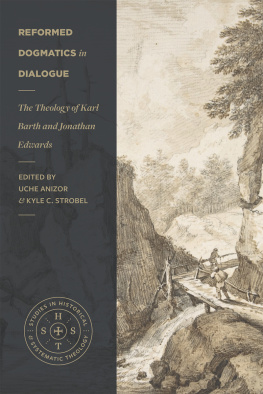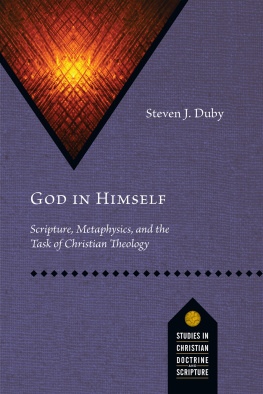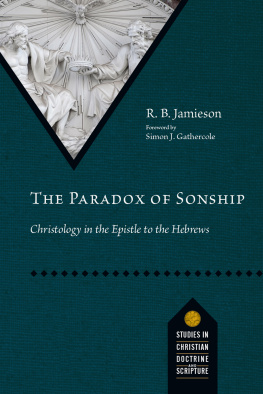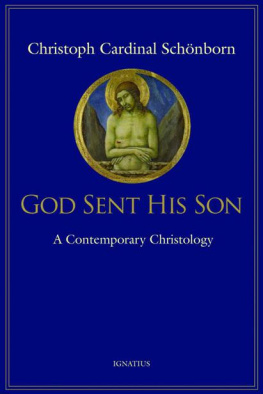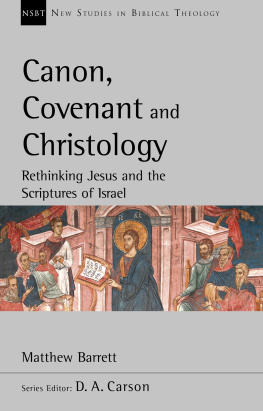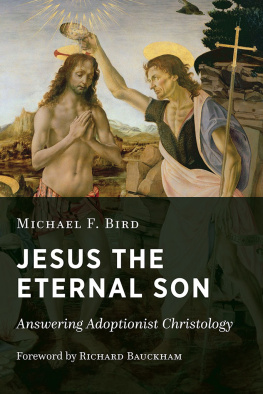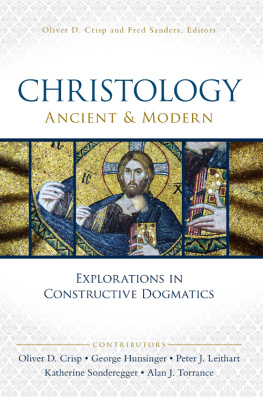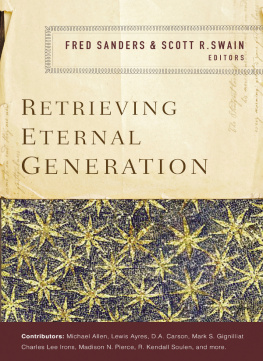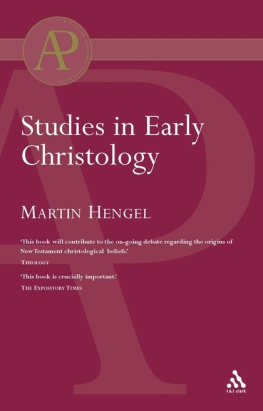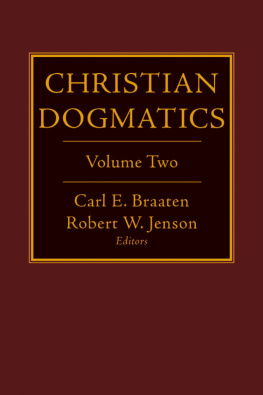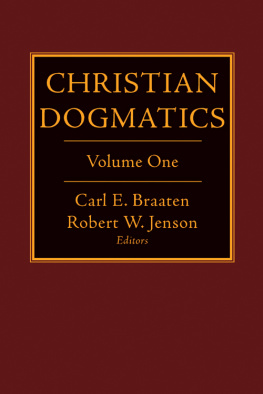Contents
Half Title Page
Title Page
Copyright Page
Dedication
Acknowledgments
Introduction
Abbreviations
1. Biblical Christology and Classical Theism
I. Introduction
II. Christological Challenges to Classical Theism
III. Opposition to Metaphysics
IV. Revisiting Gods Perfections
V. Revisiting the Role of Metaphysical Concepts
VI. Conclusion
2. The Word Was with God: The Sons Eternal Relation to the Father
I. Introduction
II. Biblical Description
III. The Unity and Simplicity of God
IV. Essence, Persons, and Relations
V. Two Challenges
VI. Conclusion
3. Foreknown before the Foundation of the World: The Sons Election and Mission
I. Introduction
II. Biblical Description
IV. Election, Immutability, and the Pactum Salutis
V. Procession, Mission, and Historical Assumption
VI. Conclusion
4. And the Word Became Flesh: The Sons Relationship to His Human Nature
I. Introduction
II. Biblical Description
III. Dogmatic Elaboration
IV. Concerns about the Communicatio Idiomatum and the Extra Calvinisticum
V. Response to Concerns
VI. Conclusion
5. The Spirit of the L ORD Is upon Me: The Sons Dependence on the Holy Spirit
I. Introduction
II. Biblical Description
III. Concerns regarding the Unity of Gods Operations
IV. Unity and Diversity in Gods Operations
V. The Gifts of the Spirit and the Human Experience of the Son
VI. Conclusion
6. I Have Come to Do Your Will, O God: The Sons Obedience
I. Introduction
II. Biblical Description
III. Faith, Weakness, and Growth in the Obedience of Christ
IV. Questions about Christs Sinlessness and Spiritual Exertion
V. The Logic of Christs Spiritual Exertion
VI. Conclusion
7. A Man of Sorrows: The Sons Suffering
I. Introduction
II. Biblical Description
III. Impassibility and the Nature of Passions
V. Impassibility and Reduplicative Predication in Christology
VI. Conclusion
Conclusion
Bibliography
Index of Authors
Index of Subjects
Index of Selected Greek Terms
Index of Scripture and Other Primary Sources
Cover Flaps
Back Cover
Acknowledgments
The encouragement, wisdom, and feedback of various friends, colleagues, and colaborers in Christian theology have helped to bring this book to completion. To Dave Nelson in particular I am grateful. His support of the work from the beginning and his incisive contributions as a dialogue partner and editor have been excellent.
I am thankful to friends at Phoenix Seminary for their outstanding love, support, and hospitalityand their willingness to let me bother them with exegetical questions. Several individuals, especially Ivor Davidson and Tyler Wittman, have graciously interacted with me on the questions addressed in this study and have read portions of the manuscript to give feedback. I am grateful for their steady wisdom and good judgment in the work of theology.
My parents continue to be a great source of encouragement. I am thankful for their interest in what I do and admire their perseverance through the course of lifes challenges. My wife, Jodi, continues to reflect the love of Christ to me and our four children. I want to dedicate this book to our children (Charlie, Evie, Wyatt, and George), each an expression of Gods goodness to us, in the hope that they may grow up always following the eternal Son, who took on flesh for us and for our salvation.
Introduction
In 2008 Richard Bauckham published a collection of essays under the title Jesus and the God of Israel , offering a description of the person of Jesus Christ in relation to the identity of the God revealed in the Old Testament. Other biblical scholars also have taken up the challenge of exploring the interface of Christology and theology proper in the Bible and early Christianity.
I should also mention that the phrase classical theism is an imprecise one. I use it here only because it has been used by many as an expedient designation for an account of the triune God holding that he is simple, immutable, impassible, and eternal (words to be defined later on). I have no particular interest in defending the phrase classical theism or employing it for constructive ends, which is why it ends up appearing infrequently in this study and typically in quotation marks. The aim of this volume is not to quibble about the fecundity of a single phrase but rather to deal with substantive issues in Christology and trinitarian doctrine. Given the nature of this book, it should be clear that I am not implying that classical theological commitments should be exempt from all analysis. Nor am I implying that there is complete uniformity to be found across the Christian tradition in authors like Athanasius, Augustine, Thomas Aquinas, and others. Nevertheless, I will maintain that, at a general level at least, such authors do present a broadly cohesive set of exegetical and theological resources that will prove fruitful in contemporary Christology.
I also want to recognize here that words and phrases like traditional, more traditional, and catholic tradition appear in various places throughout this volume. The use of such words and phrases is not intended to discourage or replace actual exegetical and theological reasoning. The goal is not to try to conserve what is older simply because it is olderas if that might be an end in itselfbut rather to set forth the christological teaching of Holy Scripture and to explore the extent to which certain theological resources that do happen to be older can help us to interpret Scripture well. When speaking about accounts of Christ or the Trinity that are traditional or part of the catholic tradition, I have in mind a body of Christian teaching on central topics about which there is a broad agreement, expressed in statements from the ecumenical councils of the patristic period, in biblical commentaries and topical treatments of theological questions in the medieval period, and in early modern Protestant confessions of faith. My sense is that even in the midst of their diverse ways of handling certain matters, one can find this kind of broad agreement in figures such as Gregory of Nyssa, Augustine, Cyril of Alexandria, John of Damascus, Peter Lombard, Bonaventure, Thomas Aquinas, and Protestant orthodox theologians.


